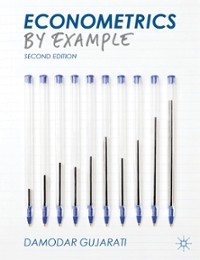Question
1. The fundamental problem of economics is: Multiple Choice to establish prices that accurately reflect the relative scarcities of products and resources the scarcity of
1. The fundamental problem of economics is:
Multiple Choice
- to establish prices that accurately reflect the relative scarcities of products and resources
- the scarcity of productive resources relative to consumer wants
- to establish a democratic political framework for the provision of social goods and services
- to establish equity between personal and business taxation
- to achieve a fair distribution of money income to reduce poverty
2. The production possibilities curve:
Multiple Choice
- shows all levels of production that are consistent with a stable price level
- shows how an economy actually employs its resources
- is a frontier between all combinations of products that can be produced and those combinations that cannot be produced
- indicates that any combination of products lying outside the curve is undesirable
- shows all combinations of products that are most preferred by consumers
3. Ceteris paribus means that:
Multiple Choice
- all other things remain the same
- prosperity inevitably follows recession
- if event A precedes event B, A has caused B
- if event A happens then event B cannot happen
- economics deals with facts, not values
4. The study of economics is carried out because:
Multiple Choice
- resources are scarce in relation to consumer wants
- resources are overly abundant as compared with wants and, therefore, a distribution problem exists
- government aids in the efficient distribution of scarce resources
- the market system is an obstacle to the efficient use of plentiful resources to satisfy limited wants
- government interferes with the efficient distribution of scarce resources
5. Normative statements are concerned with:
Multiple Choice
- what can never be
- what is
- what ought to be
- rational choice involving costs and benefits
- facts and theories
6. Which of the following is a positive statement?
Multiple Choice
- I dislike humid nights.
- The temperature is 22C.
- The humidity is too high today.
- I enjoy summer evenings when it cools off.
- It is too hot to jog today.
7. Which of the following is a drawback of a market economy?
Multiple Choice
- income equality
- positive external effects
- recessions and unemployment
- inefficient use of scarce resources
- too little economic freedom
8. Which of the following is not an illustration of the notion of opportunity cost?
Multiple Choice
- The more time it takes to commute to work, the less time is available for other activities.
- If I buy a pizza, I will not be able to afford a movie.
- Resources devoted to the production of computers are not available for the production of computer software.
- A growing economy can produce more ice cream and more ice cream cones at the same time.
- The land on which a Saskatchewan farmer plants wheat is not available for barley production.
9. Suppose a marketing research firm administers a telephone survey in order to collect and analyze data for a client that is interested in learning what fruit combinations would be most popular for its new frozen yogurt dessert. Which basic economic question of economics is associated with this activity?
Multiple Choice
- What to produce?
- How to produce?
- For whom to produce?
- None of the above questions relate to this decision.




Step by Step Solution
There are 3 Steps involved in it
Step: 1

Get Instant Access to Expert-Tailored Solutions
See step-by-step solutions with expert insights and AI powered tools for academic success
Step: 2

Step: 3

Ace Your Homework with AI
Get the answers you need in no time with our AI-driven, step-by-step assistance
Get Started


